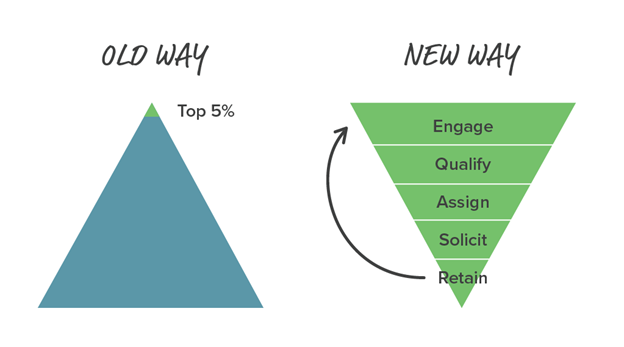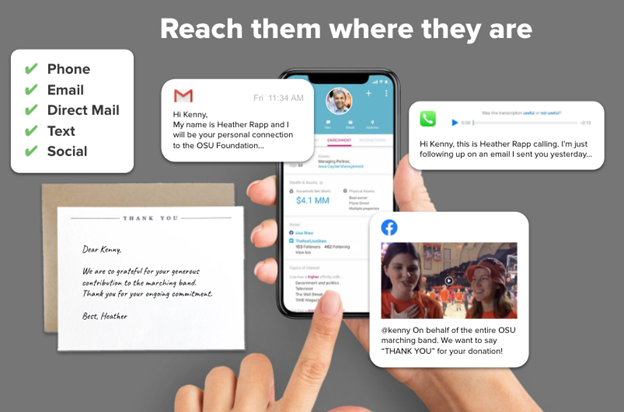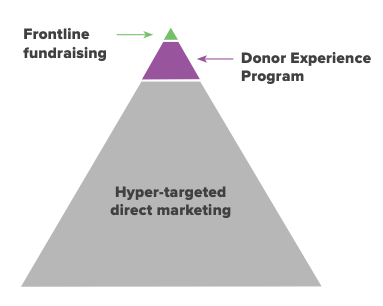
Opinions expressed in AGB blogs are those of the authors and not necessarily those of the institutions that employ them or of AGB.
The Giving Pyramid has been a trusted friend to advancement professionals for as long as any of us can remember. It’s useful for planning campaigns and providing structure to principal and leadership giving teams, but the top-down model just isn’t working for donors in today’s economy.
As we all know, donor participation is down. To be more specific, donor participation rates are down 30% in the last 15 years and 50% in the last 30 years. That’s not good news for the sustainability of our organizations.
It’s common practice to focus our attention on the top 5% of the giving pyramid. In fact, at the average university, only 2.8% of constituents are in a portfolio. However, this model neglects many thousands of loyal donors with high capacity to give and a high affinity for your institution that simply haven’t been contacted by gift officers.
Building relationships with these high-capacity overlooked prospects will ensure future major gift pipeline and is the key to the sustainability of our organizations.
What needs to change
The for-profit world has dedicated time and resources to vastly improve the customer experience, and it’s time for advancement to catch up. By borrowing strategies from the for-profit world and flipping a pyramid-driven approach into the giving funnel — where engagement leads to ongoing cultivation, donor centered appeals, and impact-driven stewardship — , many institutions are creating exceptional donor experiences for the middle and upper-middle levels of their donor base.

By implementing Donor Experience (DX) programs, these innovators are not only raising more dollars now, but they are securing major gift donors for the future.
Before the COVID-19 pandemic shut down travel and forced a (long overdue) digital transformation in the advancement world, industry innovators like Oregon State University, Louisiana Tech University, Western Kentucky University, and Boise State University have been dedicated to improving the donor experience. Let’s take a look at how they’re doing it and why it works.
DXO = Donor Experience Officer
Donor Experience Officers, or DXOs as we like to call them, deliver high-volume, personalized outreach to thousands of your best overlooked prospects.
DXOs manage thousand-person portfolios filled with leadership-and-above donors, aiming to reach every single donor multiple times throughout the year. By utilizing digital channels (email, video, social, texts), traditional outreach (print, phone), and modern technology (EverTrue), DXOs can connect with these donors on a regular basis.

In a world where we typically focus our attention on the very top of the traditional giving pyramid, DXOs are providing an exceptional donor experience to previously unreached donors and building a sustainable future for universities across the country.

By employing a for-profit sales mindset and breaking large portfolios down into digestible next steps, DXOs delight, retain, and grow more donor relationships than ever before.Unlike a traditional fundraiser, a DXO does all this for a portfolio of 1,000+ people. They’re fully tech-enabled, so they can work quickly to connect with hundreds of donors each month and deliver a completely customized, personal experience to each.
They don’t have to deal with campus meetings, managing events, or figuring out travel plans. All they do is the fun part of fundraising: finding creative ways to land meetings, delight donors, and close gifts.
By starting with pre-qualified prospects, then engaging donors in a timely manner around their interests and finally making the ask when the time is right, DXOs build relationships that lead to major and principal gift pipeline. They also focus on maintaining an 80% retention rate within their portfolios and prioritize recently-lapsed donors, keeping the health of the institution’s donor base top of mind.
The results are in
So what does this actually mean? Within the first three months of partnering with EverTrue to create Donor Experience Programs, DXOs across two institutions have had more than 360 email exchanges, 420+ phone conversations, and over 100 virtual visits with top-level donors. These activities will improve relationships, pipeline growth, and retention for years to come.
Brent Grinna is the founder and CEO of EverTrue.
References and Resources
- GUIDE: Steps to Starting a DX Program at Your Institution
- VIDEO: Learn More About Starting a DX Program
With thanks to AGB sponsor: EverTrue
Christina Chalmers
Marketing and Events Associate
EverTrue
christina.chalmers@evertrue.com


